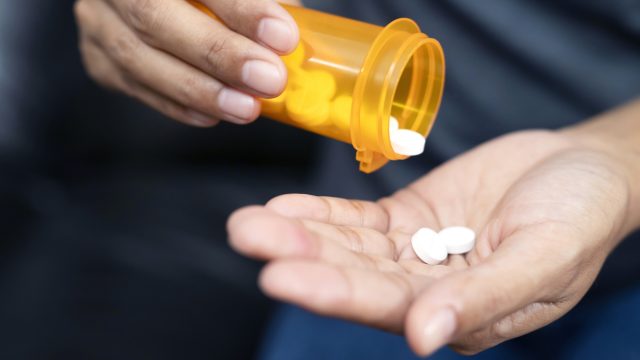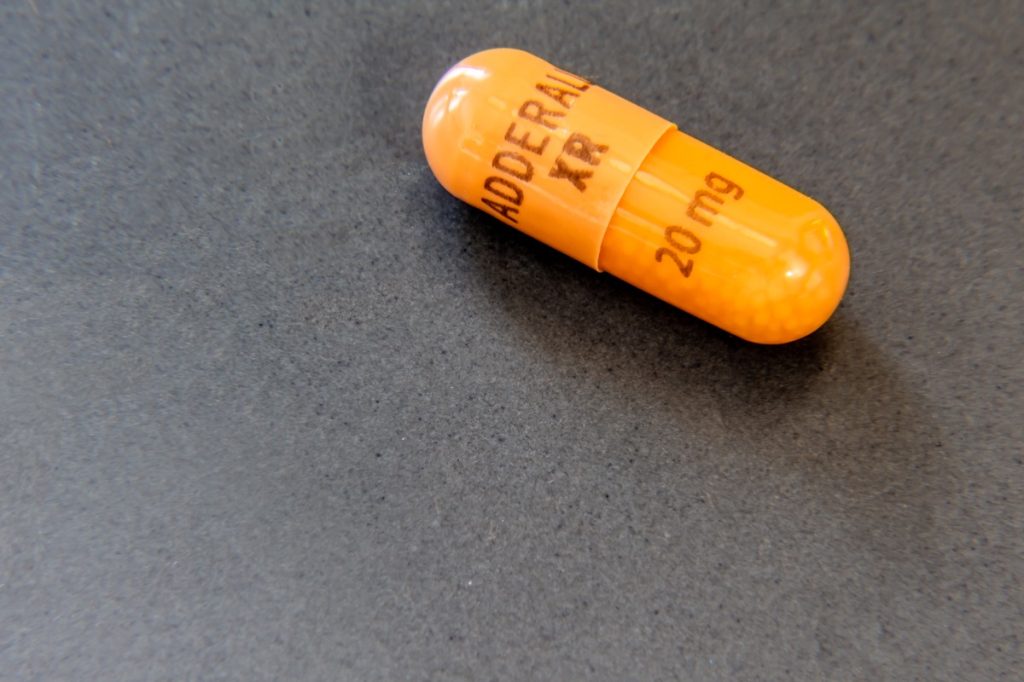This Major Medication Shortage Has Patients "Scared," New Report Says
Some patients say that all they can do is "hope for the best."

If you're on prescription medications, there's a good chance they play at least a somewhat important role in your life. And whether it's to help manage a chronic condition or keep your heart health in check, it's not uncommon to have a pill bottle with your name on it. In data collected between 2015 and 2016, researchers found that 45.8 percent of the U.S. population had used a prescription drug within the past 30 days, according to a study from the Centers for Disease Control and Prevention (CDC) published in 2019. But while getting a refill usually is as easy as calling your pharmacist, a new report shows that a major shortage of one medication has patients "scared." Read on to see which pills have been scarce recently.
READ THIS NEXT: I'm a Pharmacist, and This Is the Medication I Always Warn Patients About.
Federal agencies keep a list of medications in short supply.

The COVID-19 pandemic made shortages of everyday items like toilet paper or cleaning supplies an all-too-familiar sight. But while ongoing supply chain issues have created some relatively minor inconveniences, they're also affecting vital products like medications.
According to the Food & Drug Administration (FDA), such shortages occur due to "manufacturing and quality problems, delays, and discontinuations" of certain drugs. The agency says it receives information from manufacturers and "works closely with them to prevent or reduce the impact of shortages."
But since stocking issues can sometimes become unavoidable, the FDA also collects and lists the medications in short supply. The agency lists 125 drugs "currently unavailable in the U.S. ranging from treatments for allergies and arthritis to a blood pressure drug that doesn't have many alternatives," as of Oct. 4, per Becker's Hospital Review.
A new report says an ongoing shortage of a major medication has patients "scared."

While it's not included on the official list, one drug that has become harder to find is Adderall, the medication used to treat attention deficit hyperactivity disorder (ADHD). Supplies recently became strained when Teva Pharmaceutical Industries Ltd., the nation's largest supplier of the drug, reported a labor shortage this past August and placed it on backorder, Bloomberg originally reported.
Now, the medication shortage is beginning to affect the people who rely on it daily. In an Oct. 4 report published by Vice, some have described calling around to multiple pharmacies to locate supplies to no avail. Others in dire circumstances have even considered sourcing the drug through non-traditional means.
"I don't trust the black market. I do not trust it with a thousand-yard stick," Ian Wrobel, a 33-year-old public service worker from Missouri, told Vice. "I'm just scared of trying something different, since I've been so used to what I've been given for so long," he said while describing conversations with his doctor about switching medications.
Others have complained that they can't fully function without the aid of their prescription. "My life is turned upside down. My ability to deliver both at work and in my personal life the way I'm used to is compromised," Pat Cassidy, a 37-year-old from New Jersey who has taken Adderall for more than a decade, told Vice.
RELATED: For more up-to-date information, sign up for our daily newsletter.
The shortage appears to be getting worse.

Unfortunately, most signs indicate there won't be any relief soon for those waiting for the drug. According to a survey from the National Community Pharmacists Association, more than six in 10 small pharmacies said it was challenging to secure orders of Adderall this past August, per USA Today. And in late September, Lannett Co. and Par Pharmaceuticals—two other major manufacturers of the drug—reported that there would be limited supplies of generic extended-release versions of the drug, according to the University of Utah Pharmacy Services website.
Besides the recently diminished supply, the strain could also be affected by a recent surge in people taking it. "In 2021, Adderall prescriptions went up to 41 million from 37 million the year before. The rise in demand has been linked to the ongoing pandemic as more people are struggling with anxiety," Harold Hong, MD, a psychiatrist at New Waters Recovery in North Carolina, told Healthline in September.
Patients are left with few other options when their personal supplies run out.

The ongoing shortage is also bringing to light misconceptions about the drug and just how helpful it is for those who take it.
"We've always talked about educational deficiencies as a result of ADHD, but we've been lacking in discussing the social implications," David W. Goodman, MD, assistant professor of psychiatry and behavioral sciences at the Johns Hopkins University School of Medicine, told Vice. "People become very adamant about having their medicine—not because they're abusing the drugs, but because they realize how important the medicine is to their daily functioning at work and at home."
Besides feeling worse for not having access to the medication, patients who suddenly stop taking the drug can also experience withdrawal symptoms, Goodman says. These can include feeling irritable, a sudden increase in appetite, and feeling lethargic or a sudden lack of motivation.
Ultimately, many patients simply feel powerless by not being able to access their prescriptions. "The only thing that we can do is just call and hope for the best, and that seems really unfair," Kristin, a 34-year-old from California who wished to remain anonymous, told Vice.
Best Life offers the most up-to-date information from top experts, new research, and health agencies, but our content is not meant to be a substitute for professional guidance. When it comes to the medication you're taking or any other health questions you have, always consult your healthcare provider directly.





















